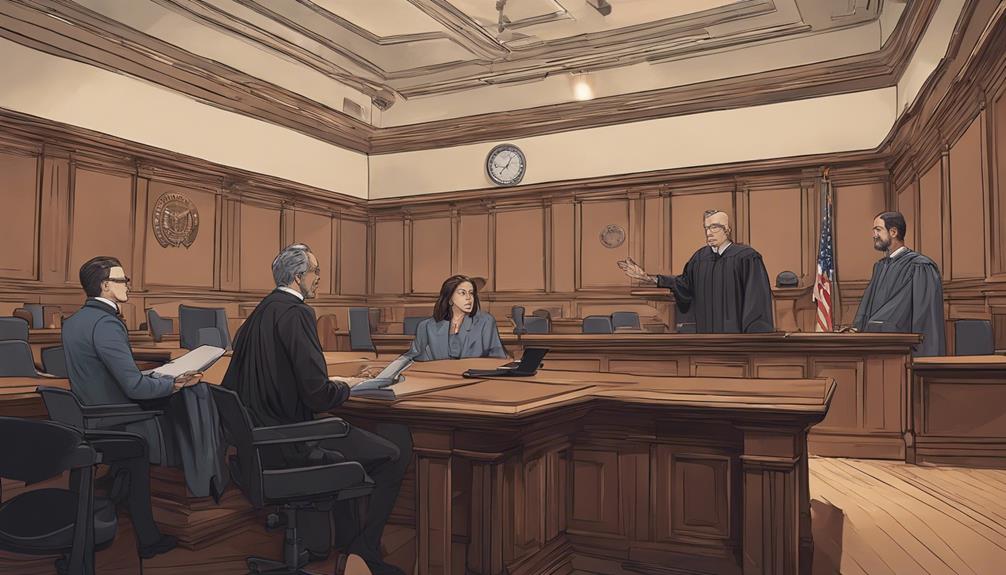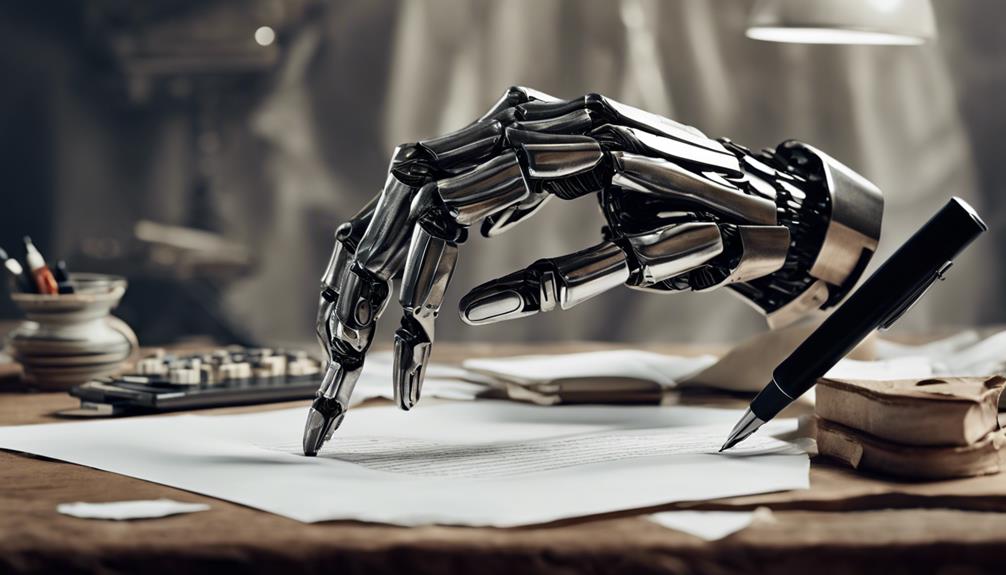In an era characterized by rapid technological advancements, the importance of careers with lasting stability and durability for the future is growing.
While Artificial Intelligence (AI) continues to revolutionize various industries, there exist certain professions that seem to be shielded from its disruptive impact.
These careers, encompassing diverse sectors such as healthcare, education, creative arts, and legal services, possess intrinsic human qualities that AI currently cannot replicate.
By exploring these job roles, individuals can secure their foothold in an ever-evolving job market.
Key Takeaways
- Healthcare professions rely on human interaction and critical thinking, making them essential and irreplaceable.
- Education and teaching jobs emphasize skills like analytical thinking and empathy, ensuring future job growth.
- Creative industries value human creativity and emotional expression, setting them apart from AI automation.
- Legal careers require human judgment for navigating complex legal landscapes, making them resistant to AI impact.
Healthcare Professions
Healthcare professions stand out as resilient to the disruptive impact of AI due to their reliance on human interaction and critical thinking skills. Unlike many other fields, jobs in healthcare, such as therapists and surgeons, heavily depend on human emotional intelligence and judgment that AI currently cannot replicate. The essence of patient care lies in the hands of healthcare professionals who offer personalized expertise and cater to individual well-being. Nurses, doctors, and therapists bring irreplaceable human qualities to their roles that are indispensable for fostering patient trust and comfort.
The stable career opportunities within healthcare stem from the unique human skills and expertise required in these professions. The demand for healthcare professionals is projected to continue growing, emphasizing the enduring need for their specialized care. In a world where AI is making strides in various industries, healthcare remains a sanctuary for those seeking fulfilling careers that prioritize human connection, critical thinking, and unwavering dedication to improving the well-being of others.
Education and Teaching

Amidst the evolving landscape shaped by artificial intelligence, the field of Education and Teaching emerges as a dynamic sector poised for significant growth and transformation. Job growth in education and teaching roles is projected to increase by 10% by 2027, with non-G20 countries experiencing even higher rates of growth.
The integration of education technologies is a driving force behind the creation of jobs within the education industry. As AI continues to reshape job requirements, efforts to bridge skills gaps are creating more job opportunities in this sector. Key skills that are in demand include analytical thinking, creative problem-solving, empathy, leadership, and talent management.
Notably, non-G20 countries are witnessing a more substantial job growth rate in education compared to G20 nations, underscoring the global impact of AI on teaching roles. As individuals seek future-proof careers, investing in the development of these skills will be essential for those pursuing a profession in education and teaching.
Creative Industries and Arts
The creative industries and arts sector rely heavily on the unique talents and emotional depth of human artists, making it resistant to AI's attempts at replication. AI struggles to capture the essence of creativity, improvisation, and emotional expression that are central to artistic performances.
This sector's emphasis on live, interactive experiences further solidifies the irreplaceable role of human artists in engaging audiences in truly original ways.
Job Roles in Arts
Within the realm of the arts, job roles in creative industries and arts stand out as bastions of human creativity and ingenuity, impervious to the encroachment of artificial intelligence. Careers in arts thrive on elements such as emotion, expression, and originality, which are deeply rooted in the essence of human experience.
Professionals in fields like music and performing arts bring a personal touch and offer unique experiences through their work, attributes that AI struggles to replicate. The arts sector values intuition, interpretation, and artistic vision – qualities that are inherently human and essential for pushing boundaries and fostering innovation.
Job roles in arts require a level of creativity and individuality that sets them apart, safeguarding them from the threat of automation.
Impact of Creativity
In the landscape of creative industries and arts, the profound impact of human creativity emerges as a defining force, shaping the future trajectory of these resilient sectors. Creative industries remain safeguarded from automation due to the essence of original ideas, a realm where AI falls short.
Computers' limited ability to automate only 26% of creative tasks underscores the indispensable role of human creativity and innovation in the arts. Professionals in creative fields find security against AI displacement as automated systems are susceptible to copyright infringements.
Within the performing arts sector, human expertise is paramount for conveying expressions, agility, and precise movements beyond the capabilities of AI. Roles like directing plays and choreographing performances demand human creativity and intuition, rendering them resistant to automation.
Legal and Law Careers

Legal and law careers present a unique challenge for AI due to the intricate human judgment and ethical considerations involved. The complexity of legal decision-making, the need for emotional intelligence, and the demand for adaptability in unprecedented cases set legal professionals apart from AI capabilities.
In navigating areas like robotic process automation and compliance, human lawyers continue to hold a crucial role in upholding justice and interpreting the law.
Robotic Process Automation
Transforming legal and law careers, Robotic Process Automation (RPA) plays a pivotal role in automating repetitive tasks such as document review and contract management. RPA enhances efficiency in legal processes, reducing human error and increasing productivity. It allows legal professionals to focus on higher-value tasks requiring human judgment and strategic decision-making. The adoption of RPA in legal and law careers is on the rise, offering opportunities for streamlined workflows and significant cost savings.
- RPA streamlines document review and contract management tasks.
- RPA increases efficiency and reduces human error in legal processes.
- Legal professionals can focus on tasks requiring human judgment and strategic decision-making.
- Adoption of RPA in legal sectors offers opportunities for cost savings and streamlined workflows.
Ethics and Compliance
The evolution of legal and law careers is intricately tied to the ethical considerations and compliance standards that underpin the foundation of professional practice. Legal and law careers in ethics and compliance require human judgment and ethical decision-making in navigating complex legal landscapes. Professionals in these roles interpret laws and regulations, ensuring organizational adherence to ethical standards and legal requirements. Human expertise is crucial in analyzing and applying legal principles to unique situations, making legal careers resilient to AI automation. Ethical considerations in law demand a nuanced understanding, ethical reasoning, and emotional intelligence, areas where human judgment is irreplaceable. Ethics and compliance professionals uphold ethical standards, corporate governance, and regulatory compliance through their expertise and ethical decision-making abilities.
| Key Aspects | Importance |
|---|---|
| Human Judgment | Crucial in legal analysis |
| Ethical Decision-Making | Essential for compliance |
| Regulatory Compliance | Ensuring legal adherence |
| Corporate Governance | Upholding ethical standards |
Human Resources Management

With the evolution of technology and the increasing emphasis on employee well-being, Human Resources Management has become a pivotal function in organizations worldwide.
- HR professionals play a critical role in talent management and maintaining compliance with labor laws.
- Interpersonal skills are essential for HR managers to handle employee relations effectively.
- Emotional intelligence is a key trait that sets HR professionals apart in promoting a positive organizational culture.
- Despite advancements in AI, the human touch and nuanced understanding required in HR management make it less susceptible to job displacement through full automation.
The demand for skilled HR professionals is projected to increase as companies recognize the value of investing in their employees' development and satisfaction. HR managers not only recruit and train employees but also act as mediators, ensuring a harmonious work environment. In a landscape where technology continues to advance, the human-centric aspects of HR management remain irreplaceable.
Skilled Trades and Craftsmanship

In the realm of skilled trades and craftsmanship, the mastery of intricate manual techniques remains a hallmark of expertise that distinguishes human artisans from the capabilities of AI. Professions like welding and carpentry rely heavily on manual work, demanding a level of precision and adaptability that AI struggles to replicate effectively.
These skilled trades involve decision-making in response to unique situations, a task where human judgment plays a crucial role, presenting a challenge for AI. Craftsmanship professions, such as woodworking, require creativity and artistry, qualities that AI currently lacks compared to human artisans.
The blend of manual skills, adaptability, creativity, and the need for human judgment in skilled trades positions makes them future-proof against AI displacement. This unique combination of factors ensures that these professions continue to rely on human expertise and craftsmanship, safeguarding them from automation and solidifying their importance in a world increasingly influenced by technological advancements.
Leadership and Management Roles

Building on the foundation of skilled trades and craftsmanship, the realm of leadership and management roles thrives on the intricate balance of human judgment, strategic thinking, and emotional intelligence to drive organizational success.
- Leadership and management roles require human judgment and decision-making abilities in complex situations.
- Effective leadership involves strategic thinking, problem-solving, and inspiring team members.
- Managers play a crucial role in setting goals, coordinating resources, and ensuring organizational success.
- Leadership positions demand emotional intelligence, communication skills, and adaptability to drive team performance.
In these roles, professionals excel in building relationships, fostering collaboration, and driving innovation within organizations. They navigate challenges through a blend of strategic decision-making, effective communication, and the ability to adapt to dynamic environments. By leveraging their emotional intelligence and understanding of human behavior, leaders and managers guide their teams towards achieving common goals and enhancing overall performance. This blend of skills and qualities sets them apart as essential components in the fabric of successful and future-proof careers.
Frequently Asked Questions
What Jobs Are Least Affected by Ai?
Jobs least affected by AI are those requiring high levels of human interaction, critical thinking, creativity, problem-solving, and decision-making. Such roles in healthcare, creative industries, research, human resources, management, and education rely on unique human skills AI cannot replicate.
What Job Is Most Safe From Ai?
In the landscape of jobs most secure from AI disruption, those requiring specialized human skills, adaptability to diverse scenarios, and complex problem-solving abilities stand out. These roles leverage unique human expertise that AI has not replicated.
What Jobs May Disappear Due to Ai?
As AI advances, jobs involving routine tasks, data analysis, and manual labor are at risk of disappearing. Industries like office support, customer service, and food services are particularly vulnerable. Adapting to new skillsets is vital for future job security.
What White Collar Jobs Are Safe From Ai?
White collar jobs in healthcare, education, and creative sectors are less susceptible to AI automation. Professions demanding complex problem-solving, human interaction, emotional intelligence, creativity, and strategic decision-making are considered future-proof against AI displacement, ensuring job security in these fields.
Conclusion
In conclusion, as technology continues to advance, certain careers remain resilient to automation by Artificial Intelligence. Healthcare, education, creative industries, legal professions, human resources, skilled trades, and leadership roles rely on uniquely human skills that AI cannot replicate.
By focusing on these future-proof careers, individuals can ensure their relevance in the ever-changing job market. Just as a lighthouse guides ships safely through turbulent waters, these professions serve as beacons of stability in the stormy seas of automation.









